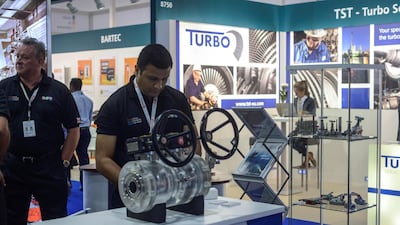More than US$10 billion worth of deals were signed at last week’s Abu Dhabi International Petroleum Exhibition Conference (Adipec), which proved to be the largest in the event’s 20-year history.
As oil prices rally to around $62 per barrel after a persistent dip since 2014, the world’s most prominent oil and gas majors congregated at a show that saw an estimated 103,000 visitors over the course of the week, demonstrating a renewal of market sentiment.
Headline news included plans revealed by Dr Sultan Ahmed Al Jaber, UAE Minister of State and group chief executive of the Abu Dhabi National Oil Company (Adnoc), to list a minority stake of at least 10 per cent in Adnoc Distribution, the UAE’s largest fuel distributor and convenience store operator, on the Abu Dhabi Securities Exchange (ADX).
Later in the week, Adnoc signed a framework agreement with China National Petroleum Corporation (CNPC) to examine joint offshore ventures and sour gas projects, including opportunities to develop Abu Dhabi’s Lower Zakum, Umm Shaif and Nasr offshore concessions, and the Bab Bu Hasa, Ghasha and Hail sour gas projects, among others.
Adipec effectively kicked off on November 12 with a gathering of chief executives of BP, Saudi Aramco, France’s Total, China’s CNPC, Exxon Mobil and Russia’s Lukoil, and other senior energy company executives from across the world, at Adnoc’s offices. The roundtable was moderated by Daniel Yergin, the Pulitzer-Prize winning author and energy economist, and sought to discuss critical issues facing the industry.
The main conference began the following day and saw a significant increase in attendance on previous records, according to Adipec organisers, with visitors from 135 different countries, 2,200 exhibiting companies, 25 country pavilions and 900 speakers.
As well as attracting more attendees, the event itself was larger, spanning 135,000 square metres of floor space at Abu Dhabi National Exhibition Centre, and featuring 185 conference sessions on technical and non-technical industry functions that could shape the future of the energy sector.
Energy leaders were positive about the impact of Opec production cuts on the industry, with the UAE's oil minister, Suhail Al Mazroui, telling The National: "The market has recovered. Demand has been better than expected." Opec secretary-general Mohammed Barkindo agreed the oil industry is benefiting from the deal to cut output agreed by both Opec and non-Opec producers. "If we hadn't done what we did last year, and jointly taken action in responding to the crisis, the industry would probably be in a different condition today," he said.
________________
Read more:
Adnoc signs agreement with Linde to explore new industrial gases complex
Exclusive: Dana Gas ready to import Iranian gas if supplies are 'reliable'
ADSB has secured Dh750m of project revenue for 2017, eyes oil and gas expansion
________________
With improving conditions, Adnoc announced expansions to offshore, onshore and downstream petroleum activities as it aims to hit targets set in its 2030 smart growth strategy. It inked an agreement with ExxonMobil and with Japan’s Inpex to increase the capacity of its offshore Upper Zakum oil field to 1 million barrels per day by 2024, having previously targeted capacity of 750,000 bpd by next year.
It also announced a significant investment to upgrade its Bab field – re-energising one of its most substantial onshore producing assets to sustain and increase output.
There were also framework agreements with partners Cepsa and Linde as Adnoc looks to expand its downstream portfolio by increasing crude refining capacity by 60 per cent and more than tripling its petrochemical production. Adnoc aims to transform the Ruwais refinery into the world’s largest integrated refining and chemicals site, which would aim to convert almost 20 per cent of Abu Dhabi’s crude to chemicals and diversify its range of higher value products.
“We are focused on creating the greatest value from our partnerships to capitalise on our oil and gas reserves and maximise the returns from our assets,” Mr Al Jaber said.
Abu Dhabi is increasingly making energy investments elsewhere in the world, too. Mubadala Investment Company revealed at Adipec it had spent $5bn in the past few months in countries offering low-cost opportunities, such as the US.

